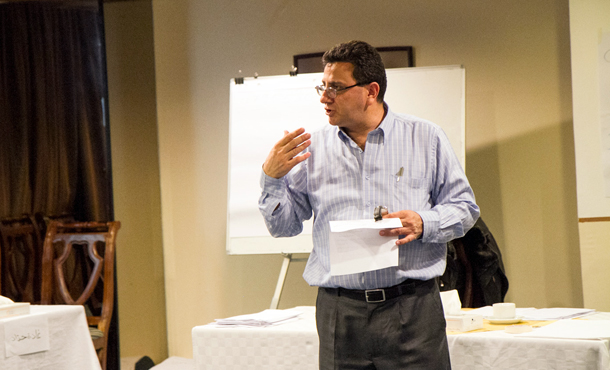Syrians are flooding into neighboring Jordan at the rate of more than 1,000 per night, seeking refuge from a brutal civil war.
Mennonite Central Committee (MCC) has taken steps to supplement its material aid (food, diapers, blankets, school kits, hygiene kits, etc.) with trainings aimed at easing growing tensions, understanding the impact of trauma, and transforming conflicts productively.
“Many arrive traumatized by the violence they have witnessed in Syria,” says Daryl Byler, the MCC program co-director for Jordan, Iraq and Iran. “The influx of refugees is straining Jordan’s budget and infrastructure and, in some cases, increasing social tensions between the refugees and Jordanian host communities.”
Can these social tensions be addressed in a non-destructive way? This is where alumni of the Summer Peacebuilding Institute (SPI) at Eastern Mennonite University have come into play. Emil El Dik, SPI 2000 and 2001, was one of three leaders of a series of six-day workshops between Dec. 18, 2012, and Feb. 16, 2013, training a total of 83 Jordanian and Syrians in peacebuilding concepts and skills, conflict resolution, trauma healing and needs assessment.
The project was envisioned by Omar Abawi, SPI 2006, a senior staff person with Caritas Jordan. Nader Abu Amsha, SPI 2009, director of the East Jerusalem YMCA, is expected to be involved in future workshops.
The 83 Jordanians and Syrians – men and women roughly aged 20 to 30 and representing various religious traditions in the region – are now able to assist Caritas Jordan, which has faced overwhelming demands for emergency response to the Syrian refugee situation. Caritas Jordan is a local partner of MCC, which funded the workshops.
This most recent work built upon a series of five-day trainings in 2011, when MCC partnered with EMU to bring Alma Abdul-Hadi Jadallah, PhD, a native of Jordan who is an EMU adjunct professor, to Jordan and Iraq to prepare a core group of people who would, in turn, run workshops on dealing with change in those countries, especially peacebuilding.
Under the leadership of Caritas, the first group of 83 trainees has been setting up joint Syrian and Jordanian committees in three cities that host thousands of Syrian refugees – Irbid, Mafraq and Zarqa. These committees are working at spreading the concepts necessary for dealing nonviolently with the challenges faced by all.
As of early January 2013, Caritas had registered more than 69,000 individuals and had offered humanitarian, educational and medical support, according to an MCC report.
There are currently more than 350,000 Syrian refugees living in Jordan, a country of 6.5 million, with a culture and tradition of welcoming those in need. More than 200,000 refugees – about three-quarters of them women and children – have registered with United Nations High Commissioner for Refugees in order to receive assistance.
In a survey cited by Caritas, “Nearly two-thirds of Jordanians favour closing the kingdom borders to more Syrian refugees, as those are placing increased pressure on economic resources and public services, such as water and electricity, as well as posing a threat to national security and stability.”
“The peacebuilding-training effort is intended to enable Syrian refugees and Jordanian host communities to feel more empowered,” says Byler, who holds bachelor’s and master’s degrees from EMU and who will be executive director of EMU’s Center for Justice and Peacebuilding starting July 1, 2013. “It will help them to understand how to handle the current refugee crisis as positively as possible. And it will help prepare leaders in the Syrian community to play long-term peacebuilding roles when they eventually return to their home country.”
As of February 14, 2013, MCC had shipped 4,141 relief kits, 11,310 hygiene kits, 17,391 school kits and 19,198 blankets to Caritas for distribution to Syrian refugees and host communities in Jordan. Additionally, MCC had provided $124,294 for local purchase of infant milk powder and diapers.

Bonnie, Thank you for this important update of the CJP graduates and SPI students working in Jordan. I am thankful that the MCC is also including the Jordanian communities in the distribution of the material aid: food, diapers, blankets, school kits, hygiene kits, etc. We will continue to support the CJP and the MCC.
Joanne B. High
What a great work is being done here! As my wonderful nephew, Kirk Shisler knows, I hope and pray that EMU’s peace effort can somehow be applied to finding a way to provide justice for our gay sisters and brothers within the context of EMU itself.
My prayers are with you!
Hello
I am very interested in this SPI courses and projects – I am a registered RJ Trainer and Practitioner with the UK RJ Council and am waitlisted for training courses with the United Nations Volunteers Program. Are there any opportunties to either undertake training or participate in your relief activities with either your specific SPI project or through the wider Zehr Institute. I am not in a position to undertake the 2yr Masters programme with the Institute but would consider any workshop or course options of a shorter nature.
Thanks for considering this request
regards
Janine Carroll
Hi Janine,
We would welcome your attendance at one of our SPI courses this summer. Check out the website at http://www.emu.edu/spi for more information about the courses offered this year and the application process.
If you have further questions, feel free to email us at spi@emu.edu.
Blessings,
Valerie Hlebert
Co-Director for SPI